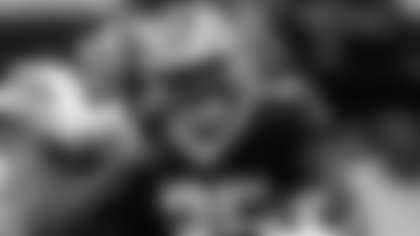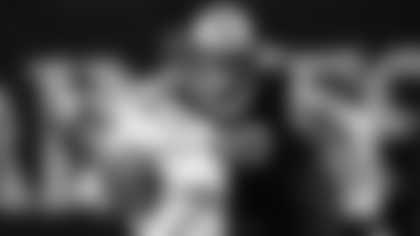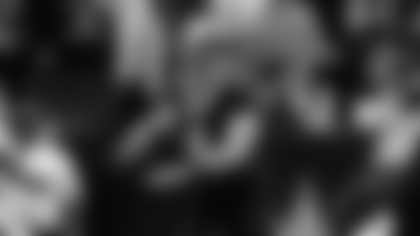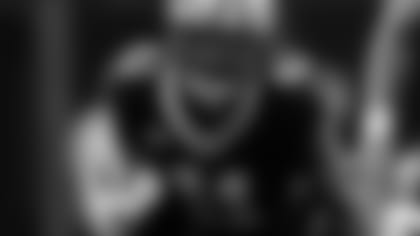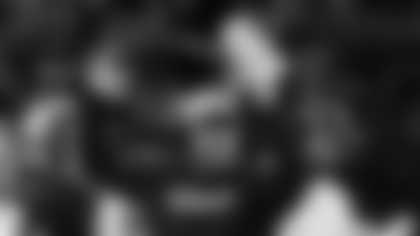New Orleans Saints Defensive Tackle Sheldon Rankins
Training Camp Video Call with New Orleans Media
Saturday, August 22, 2020
How are you feeling coming back from that injury last year?
"I'm good. I think each day I feel a little bit more and more like myself. Even on the first day out there, like, I was doing things that kind of surprised myself sometimes just from the comfort level I was doing them at, the explosion level I was doing them at. Each day I am taking steps, but definitely starting to get into that old bag of you know who I used to be."
Two years of injuries now, how do you keep yourself mentally prepared and mentally, like on top of your game? Because obviously you're used to the physical standpoint, but mentally how do you keep yourself confident?
"Well, I won't say that, like, it's not tough. It is. Just speaking from, personally, like, when the first injury happened, I was pretty much starting to come into where I felt like I was hitting my stride in this league and becoming the player I always wanted to be so for that injury to kind of knock me down and then kind of have another one follow it up rather quickly, it has been tough, but at the end of the day this is a great training staff here, great teammates, great support system at home. I've been able to not only do this myself, but I've been able to lean on others throughout the entire process and they've continued to instill in me that eventually I'll be the player who I want to be, who I was before, even better. I've just got to continue to trust the process, continue to work and, and It'll all take care of so."
What happened with that injury last year? Do you think your Achilles injury contributed to something eventually just kind of giving away?
"No, so the medical term for it is I had a Haglund's deformity. It's like an extra bone growing off the heel and it was essentially slowly but surely pushing my Achilles off the insertion point. So it wasn't a matter of if I was going to tear it, it was going to be a matter of when. That's just kind of how severe mine had gotten. So it really just became a point of do I fix it now and start the rehab or do I try to play on it, try to salvage what's left of the season and potentially tear it then have to go through a whole Achilles repair rehab again. So that's pretty much what it was. I do not think the other one contributed to it. I kind of have the same thing on that side, as well, the same deformity. So it was just pretty much a matter of time was when I was going to need to fix it and I knew I'd had it since probably college like I'd always felt kind of something back there, but wasn't to the point where it was going slow me down or prohibit me from doing what I needed to do. It really just got to that point where it was no longer we could get into the game and I was going to be able to flourish, it was at the point where anytime I would push off or do anything explosive, it literally felt like it was going to tear so it was just at the point in time where I needed to get it fixed. So I can get back to playing the style of ball I know I can play. Any athlete will tell you if you're going out there and you don't feel like you can do the things that you know you can do, that puts you in a dark place. I just want to be able to get back to my happy place essentially, being able to be disruptive and play great football."
When you're going through the process, what are the benchmarks you look for in recovery that says, "Okay, I'm on track. I feel like I'm going to be exactly what I was or what I think I'm going to be?
"Yeah, so obviously it starts from the medical side of just making sure it's healed properly in the correct positions, everything where it needs to be. And then from that standpoint it's about strengthening. My teammates will tell you I lift heavy so, for me, I just need to be able to lift heavy. If I can go in there going there and, I think during this rehab I got to deadlifting 700 pounds for multiple reps. So like when I can start doing those types of things again, that's when I know from a strength perspective, okay, we're getting there. And then from a movement perspective, I'm a up feel, twitchy, kind of guy. I'm not a guy who's going to sit there. I'm not 320. I'm not going to sit there and just sit down on the line of scrimmage and take double teams and not move like I want to get up the field. I want to be twitchy, get around corners, edges, spin moves, you guys have seen it. Once I can start working into some of that, feeling like my get off's strong, feeling like I can get off with Cam (Jordan), I can get off with Marcus (Davenport), Trey (Hendrickson), those guys. Feeling like I can hang with those guys and get offs and working moves, that is when I started to feel like, okay, all right, we are kind of rounding into form. And then the last test is always like, you've just got to push on somebody, someone is got to try to block you and you have got to be able to absorb it, find the ball and go make a play. Like I said, each day we have been getting better. I feel like each day I take a step and we're going to continue that trajectory. That's how it goes."
Was it more difficult this offseason to reach those benchmarks because of the restrictions with COVID?
"No, not really. I won't say it was COVID. I think if anybody knows me and how I go about my business, worldwide pandemic aside, I had business to handle and was going get it by any means whatever it took. COVID did not slow me down too much. It may have limited certain days where I could get in the building and do certain things, but overall, was still able to kind of hit all my benchmarks. Not necessarily always exactly what I wanted because of the restrictions but all in all, it's all come together very nicely, and we just want to keep this thing rolling."
Obviously, I know getting healthy was your main focus, but improving is something we know that you always are focused on in the offseason, how did you kind of balance getting your rehab work in but also finding ways to get better?
"Yeah, so for me, it's all about like, I watch a ton of tape. I'm always trying to study, figure out what's going to work for me, what's worked for other guys, and if I can incorporate it into my game, and then also just looking at myself. I literally probably went back and watched myself from my rookie year, all the way to now. I've done a lot of self-study, done a lot of just critiquing myself and finding the better parts of myself throughout each year and trying to combine those and ultimately get back to being the player that I've always dreamt of being because I haven't hit that plateau yet."
You mentioned the deformity that you had that was kind of on both sides it sounded like with the extra bone, was that kind of a hereditary, kind of family history type thing, or is it just something that naturally developed?
"I couldn't tell you. Like I said, I know I've kind of felt it since college, that's when I first started noticing it. But again, like it was just very faint, never was a thing that really caused any concern. But, the more and more I played it started to bother me a little bit more and then really, once I tore this one, that's really when I found out all about it, that I had the deformity and then I most likely have on the other side as well because I had pretty much some of the same symptoms I was having on the left. We just tried to manage it, we just tried to treat it as best as possible. Limit reps in practice when I can, just try to get me to the game and have me feeling as fresh as possible, all the while still getting my work through the week, but just being smart about it. But like I said, it just got to the point where I really couldn't get any work in without being in a lot of pain. We just kind of went in and made that business decision to go ahead and get it taken care of so I could come back and really be myself for this year and really try to put my imprint on this team again."
Because of the injury, were you able to rehab at the Saints facility even with all the craziness with COVID going on, or did you do that outside the facility?
"I did some of it outside the facility, I'd come back in and check in periodically. But once COVID kind of hit I was already away. So I just kind of got stuck there for a little bit, but pretty much once they got back to the nitty gritty of my rehab and really get into it, I was back into building with the staff and Cam (Jordan), Marcus (Davenport) and Trey (Hendrickson) and those guys pretty much every day."
Just some clarifying questions, so obviously, this had gotten worse for you as time went on, but when could you say enough's enough and had to get it fixed? Was it week four or the week that you stopped?
"Yeah, definitely the week I stopped. I think early on, we were optimistic that we could treat it up and have me ready to play each week pretty much pain free, but that wasn't the way it worked out and then playing San Francisco, I just want to put my foot in the ground and just kind of felt something shoot up literally from that spot all the way up through my leg. My initial thought was I tore my Achilles. That was my initial thought. But, I went to put my foot in the ground again, I was like, 'Okay, it's not torn, but I can't keep doing this.' So that's pretty much (what happened). I went and saw the trainers, told them how much pain I was in and then in the coming weeks, we decided it was better off to go ahead and get it fixed and get back and be ready to roll for the season."
This won't be an issue for you ever again, hopefully?
"Listen, fingers crossed. I haven't done that much research into it, but all from what I've heard, it's handled, won't be issue again. Let's go play ball."







